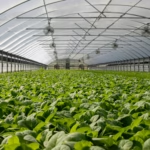
In today’s global food supply chain, trust, transparency, and traceability are not just industry buzzwords—they are necessities. As consumers become more conscious of where their food comes from, how it is produced, and whether it meets ethical and environmental standards, the need for a transparent agricultural system has grown significantly. In Africa, a continent rich in agricultural potential, one emerging technology is beginning to revolutionize how this trust is built: blockchain. The use of blockchain in agriculture, often referred to as blockchain agriculture, is proving to be a game changer in enhancing traceability, especially across African agricultural markets.
The Need for Transparency in African Agriculture
Africa is a key exporter of several agricultural products, including cocoa, cashews, spices, sesame, pulses, and more. However, one of the longstanding challenges for African exporters has been limited transparency and traceability in their supply chains. This lack of transparency can affect market access, lower buyer confidence, and even result in financial losses when buyers question the authenticity or origin of goods.
For example, in traditional supply chains, it’s difficult to verify whether a product labeled as “organic” truly meets the required standards or whether a commodity has been ethically sourced. This is where blockchain agriculture offers immense promise by enabling a digital, tamper-proof record of a product’s journey—from farm to market.
What is Blockchain Agriculture?
Blockchain agriculture refers to the application of blockchain technology in the farming and agri-export ecosystem. At its core, blockchain is a decentralized digital ledger that records transactions in a secure and transparent manner. Every transaction or data entry made on a blockchain is time-stamped and cannot be altered retroactively without the consensus of the network.
In agriculture, this technology can be used to log and verify every step a product takes: planting, harvesting, processing, quality checks, packaging, and transport. The result is a system where all parties—farmers, processors, exporters, regulators, and buyers—can access the same verified data in real-time.
How Blockchain Enhances Traceability
The primary benefit of blockchain agriculture lies in its ability to deliver trustworthy traceability. Here’s how it works in practice:
- Recording Data at the Source: Farmers can input planting dates, seed varieties, and pesticide usage into a blockchain system via mobile apps or IoT devices.
- Tracking Processing Activities: As the produce moves to processing centers, every activity—drying, sorting, grading, or packaging—is recorded, ensuring full transparency.
- Transportation and Export Logs: Transport data such as storage temperature, location, and time of movement is captured and added to the blockchain.
- Consumer Confidence: End-buyers or consumers can scan QR codes on packaging to see the full history of a product, building trust in its origin and quality.
This chain of data increases buyer confidence and allows African exporters to prove compliance with international standards, potentially opening new premium markets.
Real-Life Applications in Africa
Several pilot projects across Africa have begun integrating blockchain agriculture into real-world scenarios.
- Ghana’s Cocoa Industry: Farmers and cooperatives in Ghana have partnered with blockchain platforms to verify the source of cocoa beans, helping major chocolate companies prove ethical sourcing.
- Kenya’s Horticulture Exports: Exporters are using blockchain to track fresh produce shipments from the field to global retailers, ensuring quality and freshness.
- Nigeria’s Cashew Supply Chain: By recording each processing step on the blockchain, exporters are reducing product loss and improving payment cycles.
These case studies demonstrate that blockchain is not just a theoretical innovation—it’s an actionable tool that is already making a difference in African agri-trade.
Benefits of Blockchain Agriculture for African Farmers and Exporters
The integration of blockchain agriculture offers several tangible benefits:
- Improved Market Access: By offering verified product traceability, exporters can meet the rigorous standards of European and North American markets.
- Faster Payments: Since all data is recorded in real-time and can be verified instantly, buyers are more confident and faster to release payments.
- Reduced Fraud: The risk of tampering with shipment details, weights, or quality certifications is minimized.
- Better Farm Management: Farmers who record their activities on blockchain platforms can access valuable data for planning and productivity improvements.
- Fairer Prices: Traceable products often attract better pricing, especially if they meet sustainability or organic criteria.
Challenges to Adoption
Despite the benefits, the adoption of blockchain agriculture in Africa is not without its challenges.
- Digital Infrastructure: Many rural areas still lack reliable internet access or digital literacy, which can limit the use of blockchain-based systems.
- Cost: Initial investment in technology, training, and system integration can be high for smallholder farmers.
- Scalability: While pilot projects show promise, large-scale implementation across countries or entire industries will require significant coordination among stakeholders.
However, these challenges are being addressed through government initiatives, donor programs, and private partnerships aimed at building capacity and infrastructure.
The Role of Exporters and Agri-Tech Firms
Exporters like Ahar Group, which work closely with African farmers and global buyers, are in a unique position to facilitate blockchain agriculture adoption. By integrating blockchain into their operations, they can offer full product transparency and build a stronger brand reputation for African agricultural products.
Agri-tech firms are also developing user-friendly platforms tailored to the African context, enabling farmers to participate in blockchain-based supply chains using simple mobile devices.
Future Outlook
The future of blockchain agriculture in Africa is bright. As more stakeholders recognize its value, the technology is expected to become mainstream in agricultural export systems. Governments are beginning to support blockchain pilots, and international buyers are starting to demand greater transparency as a requirement, not just a bonus.
By embracing blockchain, Africa has the opportunity to leapfrog older systems and build a future-proof, trustworthy agricultural export ecosystem. The result is not only better business outcomes for exporters but also greater economic empowerment for farmers.
Conclusion
Blockchain is no longer a futuristic concept—it is a practical tool that is transforming how African agricultural products are grown, tracked, and sold. Through blockchain agriculture, African countries can offer buyers across the world a new level of transparency and reliability, while also empowering local farmers and building more resilient supply chains.
As more partnerships form between governments, tech providers, and exporters, blockchain’s role in Africa’s agricultural transformation will only grow stronger—offering not just traceability, but trust.











Add comment